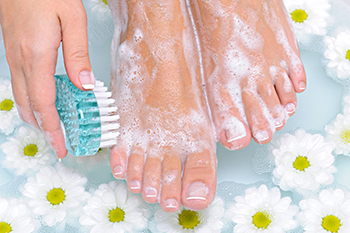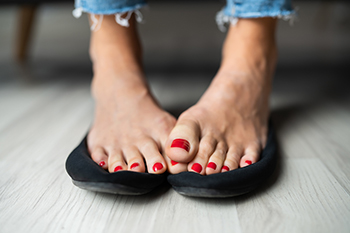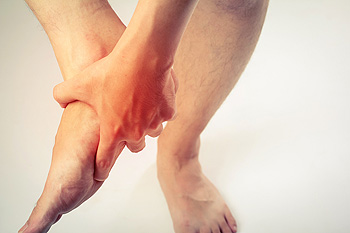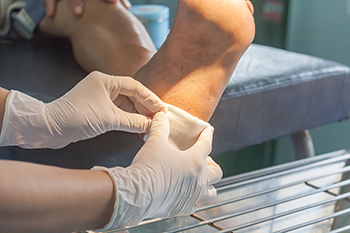
Even though our feet carry us throughout the day, they are often neglected when it comes to hygiene. Experts agree that many diseases and foot conditions can be prevented if you take care of your feet. Recommendations include doing simple tasks, like washing and drying the feet daily, keeping toenails trimmed straight across and not cut too short, and changing your socks each day. It is also recommended that shoes fit properly and be alternated to give them a chance to air out and help ward off bacterial infections. Of utmost importance to warding off infections is careful and frequent monitoring of cuts, sores, and bruises on the feet and toes. Special attention should be placed on the soles of the feet, which are hard to see and often forgotten. Several conditions directly related to foot hygiene are fungal infections like athlete’s foot, nerve and blood flow problems caused by diabetes, and ingrown toenails. For more information on proper foot hygiene, please consult a podiatrist.
Everyday foot care is very important to prevent infection and other foot ailments. If you need your feet checked, contact one of our podiatrists from Palmetto Podiatry Group of Anderson. Our doctors can provide the care you need to keep you pain-free and on your feet.
Everyday Foot Care
Often, people take care of their bodies, face and hair more so than they do for their feet. But the feet are a very important aspect of our bodies, and one that we should pay more attention to. Without our feet, we would not be able to perform most daily tasks.
It is best to check your feet regularly to make sure there are no new bruises or cuts that you may not have noticed before. For dry feet, moisturizer can easily be a remedy and can be applied as often as necessary to the affected areas. Wearing shoes that fit well can also help you maintain good foot health, as well as making it easier to walk and do daily activities without the stress or pain of ill-fitting shoes, high heels, or even flip flops. Wearing clean socks with closed shoes is important to ensure that sweat and bacteria do not accumulate within the shoe. Clean socks help to prevent Athlete’s foot, fungi problems, bad odors, and can absorb sweat.
If you have any questions please feel free to contact our office located in Anderson, SC . We offer the newest diagnostic and treatment technologies for all your foot and ankle needs.

Hyperhidrosis of the feet is simply defined as a condition that can cause an individual to sweat excessively in the feet area. The sweating can be so severe that the feet even slip around in the shoes due to the excessive moisture. Due to the constant sweat on the feet, hyperhidrosis can make the feet more susceptible to infection. Hyperhidrosis of the feet might be linked to some kind of anxiety. If an individual has a particular kind of anxiety disorder, a common symptom that might manifest itself is sweaty feet. This can be linked to anxiety because sweating due to nervous feelings can often lead to a vicious cycle where an individual stresses about their sweating, causing more sweating. If you are someone that struggles with anxiety and sweating, consider reaching out to a podiatrist today. This foot specialist will be able to help you address any problems you have with hyperhidrosis.
If you are suffering from hyperhidrosis contact one of our podiatrists of Palmetto Podiatry Group of Anderson. Our doctors can provide the care you need to attend to all of your foot and ankle needs.
Hyperhidrosis of the Feet
Hyperhidrosis is a rare disorder that can cause people to have excessive sweating of their feet. This can usually occur all on its own without rigorous activity involved. People who suffer from hyperhidrosis may also experience sweaty palms.
Although it is said that sweating is a healthy process meant to cool down the body temperature and to maintain a proper internal temperature, hyperhidrosis may prove to be a huge hindrance on a person’s everyday life.
Plantar hyperhidrosis is considered to be the main form of hyperhidrosis. Secondary hyperhidrosis can refer to sweating that occurs in areas other than the feet or hands and armpits. Often this may be a sign of it being related to another medical condition such as menopause, hyperthyroidism and even Parkinson’s disease.
In order to alleviate this condition, it is important to see your doctor so that they may prescribe the necessary medications so that you can begin to live a normal life again. If this is left untreated, it is said that it will persist throughout an individual’s life.
A last resort approach would be surgery, but it is best to speak with your doctor to find out what may be the best treatment for you.
If you have any questions please feel free to contact our office located in Anderson, SC . We offer the newest diagnostic and treatment technologies for all your foot and ankle needs.

Many people unfamiliar with the field of podiatry might already be familiar with the condition known as plantar fasciitis, because it is one of the most common afflictions of the foot. Plantar fasciitis is typically defined as the inflammation of the plantar fascia, the band of tissue that runs along the sole of the foot. This inflammation can occur for a variety of reasons. However, it is important to be able to recognize signs of plantar fasciitis yourself, in case you develop the condition. Generally speaking, people with plantar fasciitis will experience pains in the feet when first beginning to walk in the morning. Additionally, the pain is typically located in the heels toward the back. Plantar fasciitis also may make certain physical activities uncomfortable or painful, such as walking, running, or engaging in other weight-bearing activities. If you believe that you might have plantar fasciitis, contact a podiatrist today for more information.
Plantar fasciitis can be very painful and inconvenient. If you are experiencing heel pain or symptoms of plantar fasciitis, contact one of our podiatrists from Palmetto Podiatry Group of Anderson. Our doctors can provide the care you need to keep you pain-free and on your feet.
What Is Plantar Fasciitis?
Plantar fasciitis is the inflammation of the thick band of tissue that runs along the bottom of your foot, known as the plantar fascia, and causes mild to severe heel pain.
What Causes Plantar Fasciitis?
- Excessive running
- Non-supportive shoes
- Overpronation
- Repeated stretching and tearing of the plantar fascia
How Can It Be Treated?
- Conservative measures – anti-inflammatories, ice packs, stretching exercises, physical therapy, orthotic devices
- Shockwave therapy – sound waves are sent to the affected area to facilitate healing and are usually used for chronic cases of plantar fasciitis
- Surgery – usually only used as a last resort when all else fails. The plantar fascia can be surgically detached from the heel
While very treatable, plantar fasciitis is definitely not something that should be ignored. Especially in severe cases, speaking to your doctor right away is highly recommended to avoid complications and severe heel pain. Your podiatrist can work with you to provide the appropriate treatment options tailored to your condition.
If you have any questions please feel free to contact our office located in Anderson, SC . We offer the newest diagnostic and treatment technologies for all your foot and ankle needs.

Wounds on the feet can happen for various reasons. Toe injuries, wearing shoes that do not fit correctly, or having diabetes may all contribute to having foot wounds. Diabetic patients can develop neuropathy, and they especially need to be careful of wounds that develop on the feet. This is the inability to feel cuts and scrapes on the feet, and an infection can easily occur. This can lead to getting a foot ulcer, and it is important that immediate medical treatment is sought. A podiatrist will remove dead skin that has formed, which is known as debridement. This is followed by dressing the wound, and antibiotics are often prescribed. Many times, the patient will wear special footwear which may include a boot or custom made orthotics. Diabetes occurs as a result of elevated blood sugar levels, and may be controlled by the foods that are eaten. This may help to reduce the recurrence of wounds on the feet, and regular visits with a podiatrist are strongly suggested. If you have a wound on your foot, please consult with this type of doctor who can treat existing foot wounds, and help you to manage diabetes.
Wound care is an important part in dealing with diabetes. If you have diabetes and a foot wound or would like more information about wound care for diabetics, consult with one of our podiatrists from Palmetto Podiatry Group of Anderson. Our doctors will assess your condition and provide you with quality foot and ankle treatment.
What Is Wound Care?
Wound care is the practice of taking proper care of a wound. This can range from the smallest to the largest of wounds. While everyone can benefit from proper wound care, it is much more important for diabetics. Diabetics often suffer from poor blood circulation which causes wounds to heal much slower than they would in a non-diabetic.
What Is the Importance of Wound Care?
While it may not seem apparent with small ulcers on the foot, for diabetics, any size ulcer can become infected. Diabetics often also suffer from neuropathy, or nerve loss. This means they might not even feel when they have an ulcer on their foot. If the wound becomes severely infected, amputation may be necessary. Therefore, it is of the upmost importance to properly care for any and all foot wounds.
How to Care for Wounds
The best way to care for foot wounds is to prevent them. For diabetics, this means daily inspections of the feet for any signs of abnormalities or ulcers. It is also recommended to see a podiatrist several times a year for a foot inspection. If you do have an ulcer, run the wound under water to clear dirt from the wound; then apply antibiotic ointment to the wound and cover with a bandage. Bandages should be changed daily and keeping pressure off the wound is smart. It is advised to see a podiatrist, who can keep an eye on it.
If you have any questions, please feel free to contact our office located in Anderson, SC . We offer the newest diagnostic and treatment technologies for all your foot care needs.
